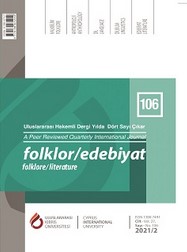Yaban Domuzu (Varāha) Mitinin Hint Mitolojisindeki Yeri Üzerine Bir Değerlendirme
An Assessment of the Place of the Wild Boar (Varāha) Myth in Indian Mythology
Author(s): Yalçın Kayalı, Ilgaz HakmanSubject(s): Customs / Folklore, Studies of Literature, Other Language Literature, Cultural Anthropology / Ethnology
Published by: Uluslararası Kıbrıs Üniversitesi
Keywords: Indian culture; Indian mythology; purāṇa literature; Varāha Purāṇa; myth of varāha;
Summary/Abstract: Varāha is known as an incarnation of the Hindu God Vishṇu (avatāra). The presentday version of Varāha Purāṇa, which was created in the name of this Hindu myth known as the Pig in the mythical tradition, is divided into four independent sections. According to Nāradīya Purāṇa, Varāha Purāṇa consists of two books (bhāga) which are Pūrva and Uttara. However, Uttara-bhāga has not survived. Literary historians share the view that Varāha Purāṇa is relatively a late work, compared to other texts that makes up the Purāṇa collection. Varāha Purāṇa is more of a guide for Hindu believers; it usually belongs to the Vishṇu-worshipers tradition. It is known that some theriomorphic (in animal form) sects of India, especially in Eastern Mālwā, worships this pig-shaped god. In about the fourth century, the cult of pig was associated with the Varāha embodiment (avatāra) in the Vishṇu belief. With this study, the characteristics of the Varāha (Pig) myth, which is named as one of the epic period sources in Indian Mythology and named after the work named Varāha Purāṇa of the Purāṇa corpus, are tried to convey the cultural reflections of the wild boar myth, which has an important place in Indo-European culture, in the history of civilization.
Journal: Folklor/Edebiyat
- Issue Year: 27/2021
- Issue No: 106
- Page Range: 455-470
- Page Count: 16
- Language: Turkish

